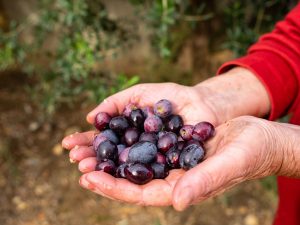
Today, we’re diving into an evergreen topic that piques everyone’s interest: what is the best diet for living a longer, healthier life? The internet is overflowing with diets claiming miraculous benefits, but let’s sift through the noise and focus on what really works.
We’ll also explore another crucial element of longevity: after the age of 65 it can be useful to pay a little more attention to how, as well as what, you eat. Read on to discover more about how diet can be complemented by lifestyle adaptations conducive to a healthier, longer life.
The Mediterranean Diet: A Time-Tested Gem
 Central to any conversation about nutrition is the Mediterranean diet, renowned for its myriad health benefits. Known for their longevity, people in countries bordering the Mediterranean Sea eat a diet rich in fruits, vegetables, whole grains, nuts, and seeds, harmonized with a moderate amount of dairy. Heart-healthy fats from olive oil and fish play a central role, while red meat and processed foods take a back seat.
Central to any conversation about nutrition is the Mediterranean diet, renowned for its myriad health benefits. Known for their longevity, people in countries bordering the Mediterranean Sea eat a diet rich in fruits, vegetables, whole grains, nuts, and seeds, harmonized with a moderate amount of dairy. Heart-healthy fats from olive oil and fish play a central role, while red meat and processed foods take a back seat.
Dr. Erin Woolridge, a licensed Naturopathic Doctor in Newfoundland, asserts, “The Mediterranean diet offers a nutrient rich balance for seniors, focusing on heart-healthy fats and high-fiber foods that aid in cholesterol management and digestive health.” The natural reduction in processed and high-sodium foods within this diet further underscores its suitability for senior health.
A universally appreciated way of eating, the Mediterranean diet is often recommended by medical professionals. But, according to Dr. Woolridge, the diet is not just about what they eat, but how they eat. Meals are often a leisurely, social affair, which brings us to an important aspect of longevity that we will talk about below: connection.
Blue Zones: Lessons in Longevity
 Beyond the Mediterranean shores, the dietary patterns of the world’s Blue Zones offer invaluable insights into longevity. Blue Zones are regions where people live significantly longer lives, such as Okinawa, Japan; Sardinia, Italy; and Loma Linda, California.
Beyond the Mediterranean shores, the dietary patterns of the world’s Blue Zones offer invaluable insights into longevity. Blue Zones are regions where people live significantly longer lives, such as Okinawa, Japan; Sardinia, Italy; and Loma Linda, California.
In these areas, diets are predominantly plant-based, with a heavy reliance on legumes, whole grains, and locally sourced vegetables and fruits. Meat is consumed sparingly, often reserved for special occasions. Dr. Woolridge notes, “The Blue Zones demonstrate that a diet low in meat and processed foods, and high in plant-based, whole foods, is key to longevity.”
To learn more, Dr. Woolridge recommends a great documentary on Netflix called “Live to 100: Secrets of the Blue Zones”.
Dr. Woolridge further notes that there are many chronic illnesses of lifestyle and diet that are very common to our population. “. Research supports dietary influence on things like cardiovascular disease, stroke, and some cancers. For example, Type 2 diabetes can very much be prevented, and even reversed by following a low glycemic diet, and being conscious of refined carbohydrate intake.”
The benefits of adopting a Blue Zone or Mediterranean diet come down to enjoying a diet rich in plants. But why are vegetables and fruit so important?
- They have essential nutrients our body needs to function well.
- They protect against disease.
“Eating more plants mean a range of benefits from better bowel movements to better blood sugar management,” says Dr. Woolridge. “Better skin and hair, improved microbiome variety, better moods, improved blood pressure… and the list goes on!” Small steps make a big difference to your health. Add a rainbow of extra fruit or veggie to meals and snacks. The more colourful the better – especially the dark green and orange ones!
Beyond the Plate: Lifestyle Synergy
 Diet does not exist in a vacuum. Adopting a longevity-focused diet is just one piece of the puzzle. Complementary lifestyle habits are equally vital. Dr. Woolridge reminds us to eat when rested, eat with family, enjoy a walk to and from dinner… these principles are just as important as the food!
Diet does not exist in a vacuum. Adopting a longevity-focused diet is just one piece of the puzzle. Complementary lifestyle habits are equally vital. Dr. Woolridge reminds us to eat when rested, eat with family, enjoy a walk to and from dinner… these principles are just as important as the food!
Social Connections and Meals
Eating isn’t just about nourishment; it’s a communal activity. Studies show that social connections can increase lifespan and improve mental health. When you share a meal with others, you’re not just feeding your body; you’re nurturing your soul. So, don’t just focus on what you eat, but also with whom you eat. A dinner with friends or family, full of laughter and good conversation, is just as nourishing as the healthiest meal.
The key to making it happen often starts with a plan. You could:
- plan a breakfast date with friends.
- participate in community celebrations and feasts.
- start a regular community meal with your neighbours.
Remember to put away distractions and take your time. Enjoy your food and the social aspect of being together. Use it as a chance to connect. Talk to those around you and share what is going on in everyone’s life.
Movement: More Than Just Exercise
Movement is not just about hitting the gym or running marathons. In many long-living cultures, regular, natural movement is key. Think walking, gardening, or even simple stretching. These activities keep the body active without the stress of intense regimes, making them perfect exercises for older adults in retirement. Incorporating regular movement into your daily routine is a cornerstone of a healthy, long life.
A Positive Outlook: The Mind-Body Connection
 Your mental state plays a huge role in your physical health. A positive outlook can reduce stress, lower the risk of heart disease, and improve overall well-being. Cultivating a positive mindset through practices like gratitude, meditation, or simply engaging in activities that bring joy, can have profound effects on your health and longevity.
Your mental state plays a huge role in your physical health. A positive outlook can reduce stress, lower the risk of heart disease, and improve overall well-being. Cultivating a positive mindset through practices like gratitude, meditation, or simply engaging in activities that bring joy, can have profound effects on your health and longevity.
A Holistic Approach to Diet Matters for Older Adults
Maintaining a healthy diet is important no matter your age. But as you get older, particularly after the age of 65 or so, eating well can become more challenging and lifestyle can lead to neglecting healthy eating habits.
Additionally, any loss in independence can make it harder to shop for healthy foods and cook them properly. This can leave older adults more reliant on packaged and prepared foods or meals that aren’t nutritionally complete. A particularly concerning situation since a recent study found that if more than 20% of daily calorie intake is ultra processed foods, you may be raising your risk for cognitive decline.
The Role of Retirement Residences in Promoting Longevity
 Retirement residences can play a pivotal role in helping seniors achieve these goals. All Seniors Care communities provide balanced meals, social engagement opportunities, and various physical activities, all in a safe and supportive environment. This holistic approach aligns perfectly with the principles of a healthy, longevity-promoting lifestyle, making it easier for seniors to maintain a balanced diet, stay active, and foster meaningful social connections, all of which are key to a longer, healthier life.
Retirement residences can play a pivotal role in helping seniors achieve these goals. All Seniors Care communities provide balanced meals, social engagement opportunities, and various physical activities, all in a safe and supportive environment. This holistic approach aligns perfectly with the principles of a healthy, longevity-promoting lifestyle, making it easier for seniors to maintain a balanced diet, stay active, and foster meaningful social connections, all of which are key to a longer, healthier life.
At All Seniors Care retirement communities, our chefs follow the sound advice of dieticians to design meals, and meal plans, that focus on maximizing the health of individuals in our senior living homes.
Moreover, ASC retirement homes offer educational programs on nutrition and health, helping residents understand the value of their dietary choices. This educational aspect, combined with the convenience of having healthy meals readily available, significantly enhances the ability of seniors to adhere to diets that promote longevity and well-being.
After all, longevity is not just about adding years to your life, but life to your years. Contact us today to schedule a tour in one of our beautiful independent living, assisted living, or memory care communities near you.
Writer – Julianna McLeod
Julianna is a health and wellness expert at All Seniors Care. Her mission is to create content that empowers seniors to form sustainable solutions for lasting health and happiness. She is an experienced writer, editor, and Recreational Therapist living in Toronto.